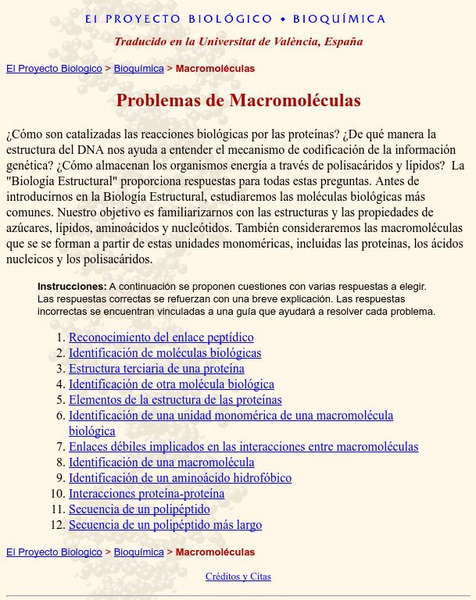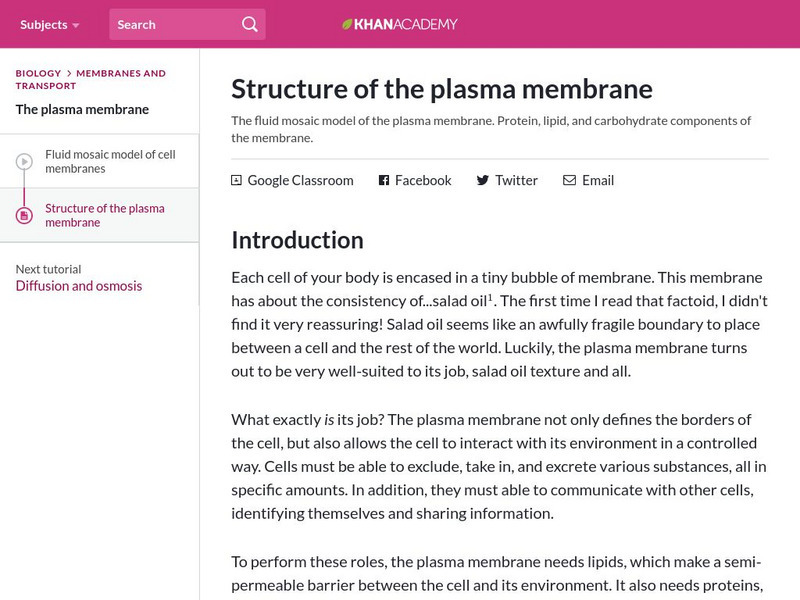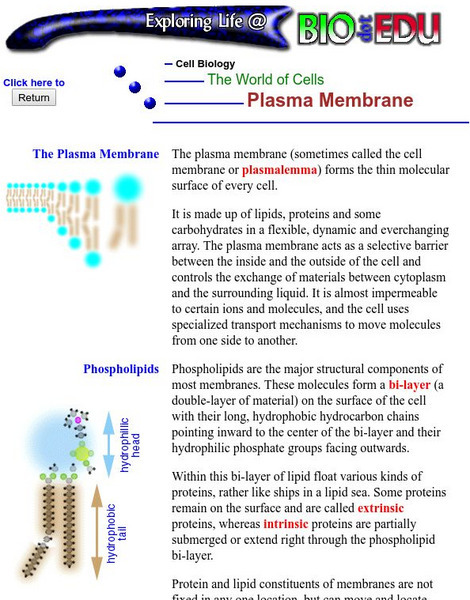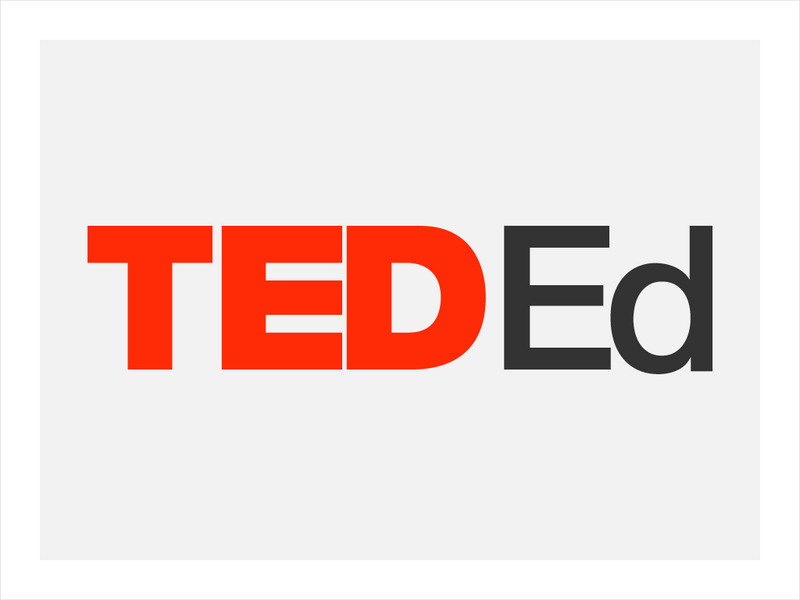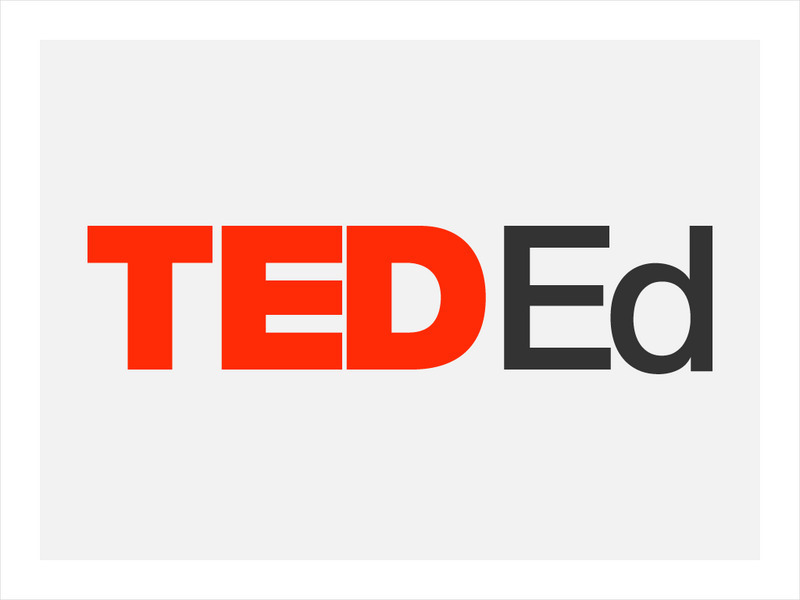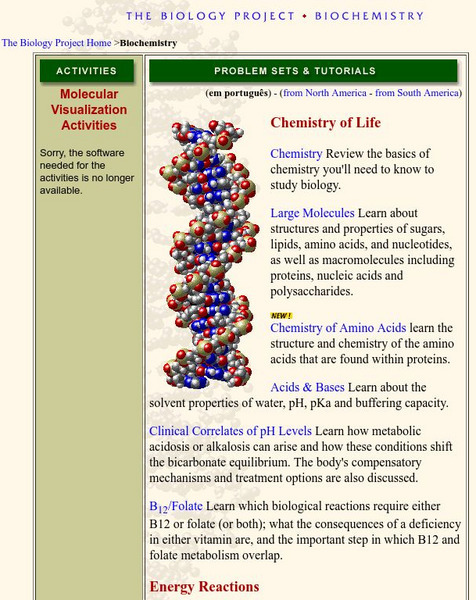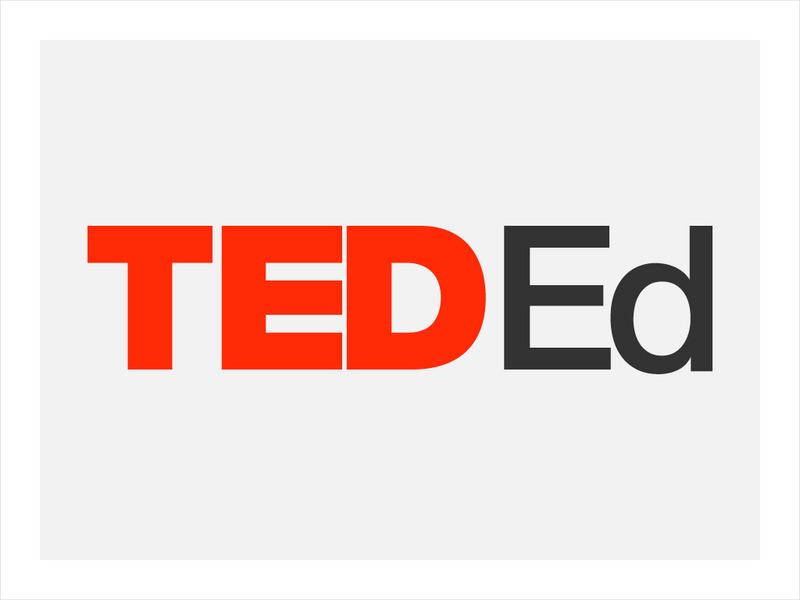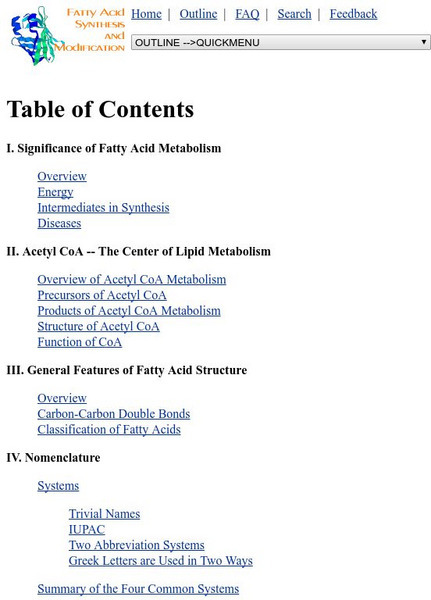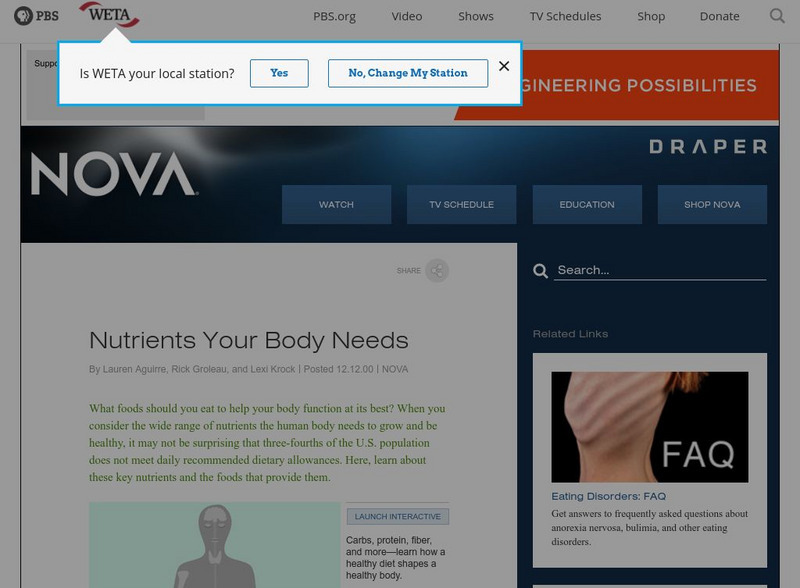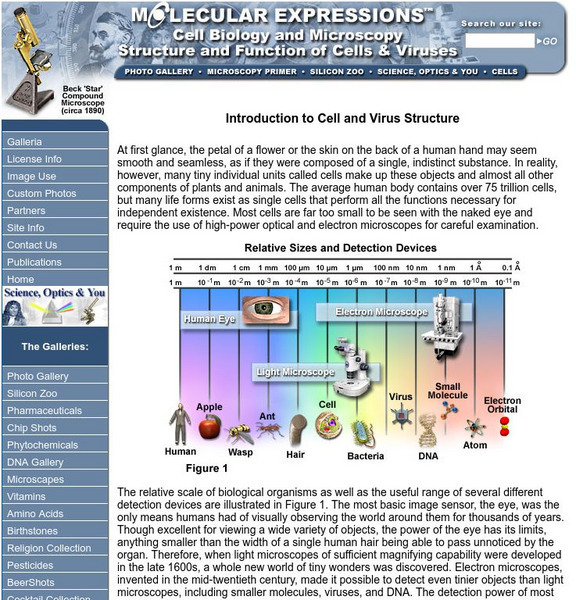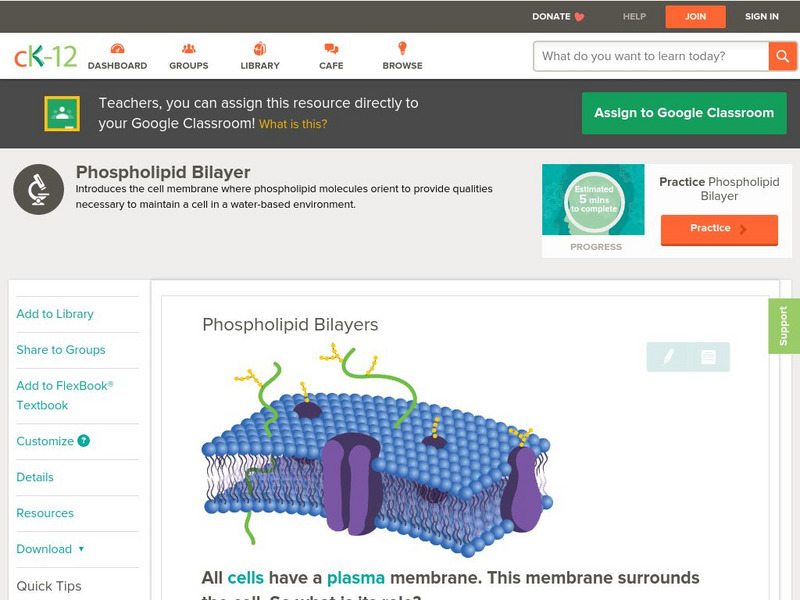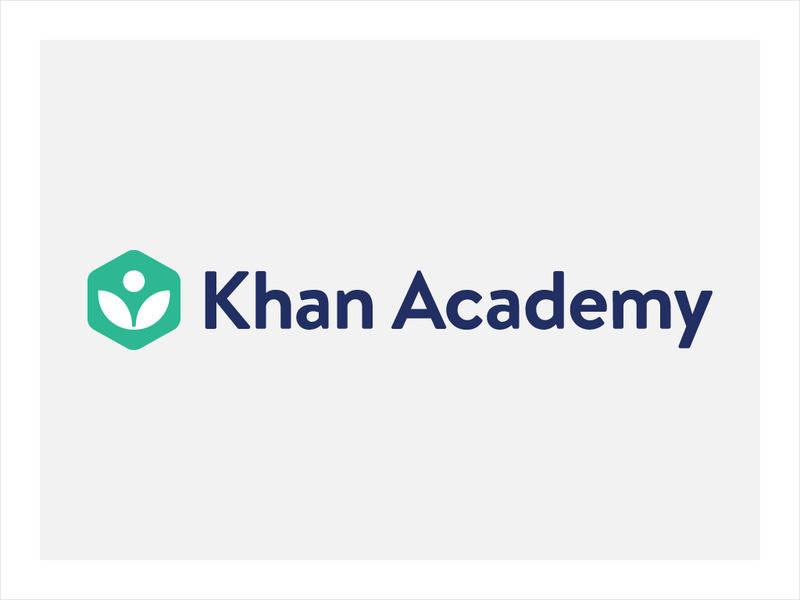University of Arizona
University of Arizona/biochemistry
Tutorial provides an overview of the structural features of carbohydrates, lipids, proteins, and nucleic acids.
University of Arizona
University of Arizona: Problemas De Macromoleculas
This unit will look at the most common biological molecules. The objective is for you to become familiar with the structures and properties of sugars, lipids, amino acids and nucleotides.
Khan Academy
Khan Academy: The Endomembrane System
Article looks at the structure and function of the different parts of the endomembrane system, how proteins, lipids, and vesicles are transported between these parts, and how this activity keeps the cell running smoothly.
Khan Academy
Khan Academy: Structure of the Plasma Membrane
Article takes a look at the different components (protein, lipid, cholesterol, and carbohydrate) of the plasma membrane, examining their roles, their diversity, and how they work together to make a secure boundary around the cell.
Other
Story md.com: Cardiovascular Risk Factors: Ldl/hdl Ratio
Under certain conditions, the risk of developing coronary heart disease (strokes, heart attack) cannot be properly assessed only by looking at a person's lipids test results. In these cases, the LDL "bad cholesterol" to HDL "good...
City University of New York
The World of Cells: Plasma Membrane
This is a basic description of the structure of cell membranes. Site provides colorful pictures of each membrane.
Vision Learning
Visionlearning: Cell Biology: Absorption, Distribution, and Storage of Chemicals
Explanation of the different ways the chemicals or medicines may enter the body through cell membranes.
Annenberg Foundation
Annenberg Learner: Applied Genetic Modification
Worldwide, millions of people are infected with the hepatitis B virus (HBV) and the world is in need of a resourceful and inexpensive vaccine. In this case study you will learn how to generate a plant that produces a hepatits B protein...
TED Talks
Ted: Ted Ed: How Do Vitamins Work?
Vitamins are the building blocks that keep our bodies running; they help build muscle and bone, capture energy, heal wounds and more. But if our body doesn't create vitamins, how do they get into our system? The following learning module...
TED Talks
Ted: Ted Ed: The Operating System of Life
Cells are almost like tiny factories run by robots, with the nucleus, DNA, proteins, lipids, and vitamins and minerals all playing critical roles. George Zaidan and Charles Morton lay out the blueprint of a cell and explain how...
CK-12 Foundation
Ck 12: Life Science: Carbon Cycle
[Free Registration/Login may be required to access all resource tools.] Carbon is one of the most common elements found in living organisms. Chains of carbon molecules form the backbones of many molecules, such as carbohydrates,...
University of Arizona
University of Arizona: Biochemistry
Problem sets, tutorials, and activities related to biochemistry.
TED Talks
Ted: Ted Ed: Why Do We Cry?
Whether we cry during a sad movie, while chopping onions, or completely involuntarily, our eyes are constantly producing tears. This learning module tracks a particularly watery day in the life of Iris (the iris) as she cycles through...
Vision Learning
Visionlearning: Biological Molecules: Fats and Proteins
An explanation of the importance of fats and proteins in the human diet. Examples of chemical structures of various fats and proteins are used.
University of Utah
University of Utah: Fatty Acids Tutorial
This tutorial on fatty acids is presented in an outline format and features related informational links.
OpenStax
Open Stax: Organic Compounds Essential to Human Functioning
Learn here about organic compounds, groups of carbon atoms covalently bonded to hydrogen, usually oxygen, and often other elements as well, and how they are essential to human functioning.
PBS
Pbs Nova Teachers: Dying to Be Thin: Body Needs
Find out what the human body needs to function at its best, and why.
Howard Hughes Medical Institute
Hhmi: Biointeractive: Molecular Structure of Fat
A comprehensive slideshow illustrating and explaining fat. Learn the structure and impact on the body.
CK-12 Foundation
Ck 12: Biology: Significance of Carbon
[Free Registration/Login may be required to access all resource tools.] Describes the significance of carbon to life on Earth.
Florida State University
Florida State University: Molecular Expressions: Introdution to Cell and Virus Structure
This resource provides a detailed diagram of animal, bacterial and plant cells and viral structure. Also included are detailed drawings, with definitions, of each of the cellular organelles.
Estrella Mountain Community College
Estrella Mountain College: Active and Passive Transport
Choose the chapter called "Active and Passive Transport" from the table of contents for explanations, comparisons, and examples of active and passive transport. This includes an illustrative diagram.
CK-12 Foundation
Ck 12: Biology: Phospholipid Bilayers
[Free Registration/Login may be required to access all resource tools.] Describes the structure and function of the plasma membrane.
CK-12 Foundation
Ck 12: Physical Science: Biochemical Compound Classification
[Free Registration/Login may be required to access all resource tools.] Biochemical compounds: their general structure and different classes.
Khan Academy
Khan Academy: Biological Macromolecules
How much do you know about biological macromolecules?
Other popular searches
- Lipid Membrane
- Carbohydrates and Lipids
- Macromolecules Lipids
- Lipids and Proteins
- Proteins Lipids
- Activity on Lipids
- Lipids in Foods
- Carbohydrates Lipids
- Lipids in Cell Membranes
- Over Lipids
- Lipids Game
- Carbo Lipids Nucleic Acids

